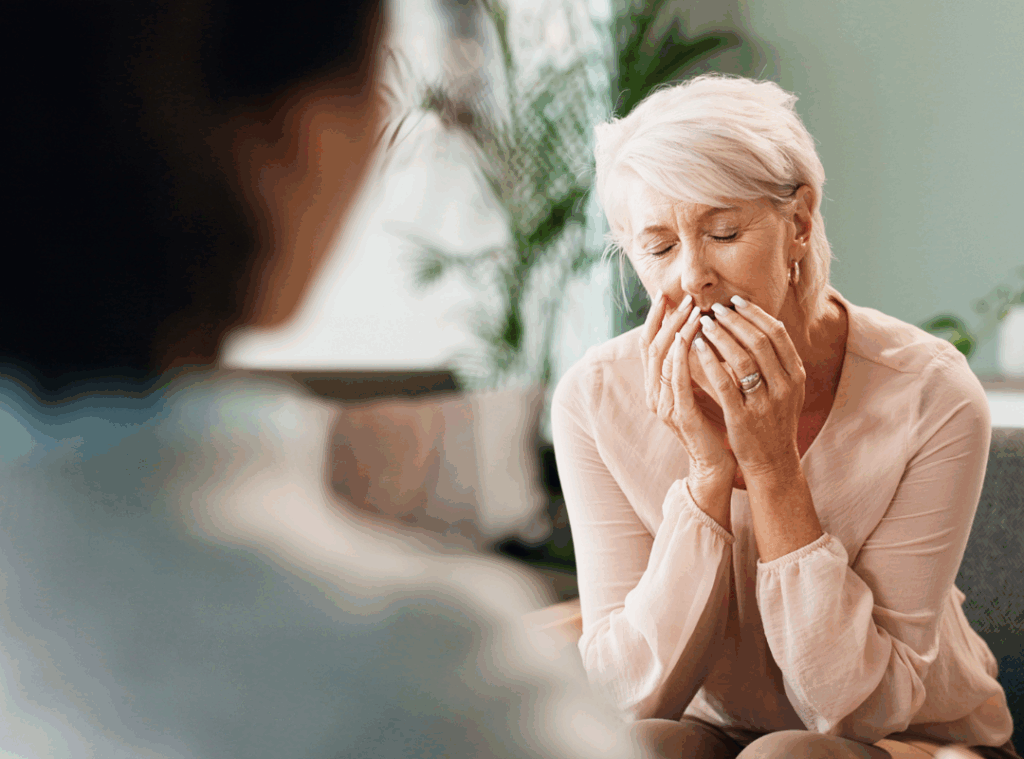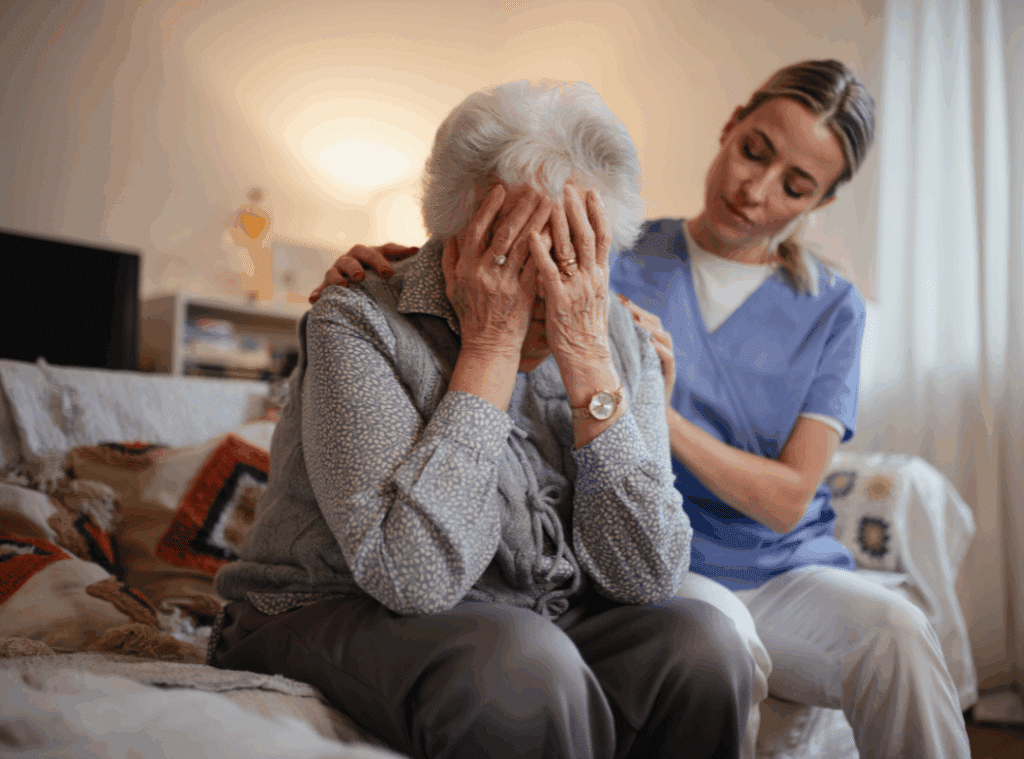Anxiety in seniors is a growing concern that often goes unnoticed or untreated. As people age, they may face health challenges, social isolation, or the loss of independence, all of which can contribute to emotional distress. While some stress is normal, persistent anxiety can interfere with daily life and overall well-being. Recognizing the signs early and taking a proactive approach to treatment can make a world of difference.
Families and caregivers must be aware that depression and anxiety in the elderly are not simply signs of aging but are treatable conditions. By understanding the triggers, symptoms, and available treatments—including anxiety meds for the elderly and natural remedies for anxiety in the elderly—you can empower your loved one to lead a healthier, more joyful life. The right support can restore a sense of control and calm to seniors navigating life’s later stages.
Recognizing the Symptoms of Anxiety in the Elderly
Identifying the symptoms of anxiety in the elderly is the first step toward managing it. Emotional signs may include excessive worry, fearfulness, irritability, or a sense of dread. Physical symptoms are also common and may include fatigue, restlessness, muscle tension, or gastrointestinal issues. Seniors may also struggle with sleep disturbances, which further impact their mental health.
It’s important to differentiate these signs from typical age-related changes. Some older adults withdraw socially or become unusually dependent on others when experiencing anxiety. Keep in mind that seniors often downplay their symptoms, making it more challenging for caregivers to recognize the issue. If your loved one exhibits these signs, consider consulting a professional for an evaluation. According to this guide, early recognition leads to better long-term outcomes.
How Do You Treat Severe Anxiety in the Elderly?
Understanding how to treat severe anxiety in the elderly is critical. A combination of approaches tends to work best, including medical, therapeutic, and lifestyle interventions. Physicians may recommend anxiety meds for the elderly, such as SSRIs, which are considered safe and effective when properly managed. Medication should always be monitored closely due to possible side effects and interactions with other prescriptions.
Psychotherapy, especially cognitive behavioral therapy (CBT), is a highly effective method for seniors. It helps them reframe negative thinking patterns and develop healthier coping strategies. Additionally, natural remedies for anxiety in the elderly, like herbal teas, aromatherapy, or supplements such as magnesium and omega-3s, may offer mild relief, particularly when used alongside traditional treatments.
Lifestyle changes—such as regular exercise, improved sleep hygiene, and structured routines—can also support emotional balance. For those experiencing depression and anxiety in the elderly, a comprehensive, multidisciplinary approach is often the key to meaningful recovery. Learn more about tailored solutions from this blog post.
Natural Remedies for Anxiety in the Elderly
If you’re seeking holistic alternatives, several natural remedies for anxiety in elderly populations can help reduce symptoms without the use of pharmaceuticals. One popular approach is incorporating mindfulness techniques such as meditation, yoga, and breathing exercises. These techniques have been shown to reduce cortisol levels and foster calmness.
Another natural remedy includes dietary adjustments. Nutrient-rich foods—especially those high in omega-3 fatty acids, magnesium, and B vitamins—support healthy brain function and reduce anxiety. Herbal options like chamomile, lemon balm, and lavender are frequently used in teas and essential oils to promote relaxation.
Spending time in nature, listening to calming music, or practicing gratitude journaling are also beneficial for emotional regulation. While these options may not completely replace medication for everyone, they provide meaningful support and may reduce the need for higher doses of anxiety meds for elderly individuals. For more ideas, the Cleveland Clinic offers a helpful overview of science-backed natural therapies.

The Link Between Depression and Anxiety in the Elderly
It’s common for depression and anxiety in the elderly to occur together. Both can severely impact quality of life, independence, and physical health. Symptoms such as lack of interest in activities, chronic fatigue, feelings of worthlessness, and changes in appetite or sleep may be signs of coexisting disorders.
Addressing both conditions requires a balanced treatment plan. Medical providers often screen for depression when seniors present with anxiety because the two are deeply intertwined. Integrated care, involving therapy, medications, and social support, is often most effective.
Emphasizing social engagement, daily structure, and physical activity can prevent these conditions from spiraling. By treating both conditions together, seniors can experience improved mood, greater resilience, and a stronger sense of purpose. Learn more about managing overlapping emotional challenges at NIMH’s resource on late-life mental health.
Creating a Supportive Community Environment
Support systems play a powerful role in the emotional well-being of seniors. Whether from family, friends, or community programs, emotional support helps reduce isolation and fosters a sense of security. Senior living communities, like Westmont of Morgan Hill, provide a built-in network of peers, staff, and programs designed to uplift residents.
Participating in community activities, such as exercise groups, art classes, or group outings, helps seniors stay mentally stimulated. These experiences foster social bonding, offer distraction from anxious thoughts, and enhance cognitive function.
For seniors dealing with symptoms of anxiety in the elderly, a supportive community can be both healing and empowering. Read more on how senior anxiety is being addressed in supportive environments.
Caregiver Tips: Supporting a Loved One with Anxiety
If you’re a caregiver, it’s essential to learn how to support an elderly loved one with anxiety. Start by fostering open communication. Listen patiently, without judgment, and encourage the expression of feelings. Creating a calm, predictable environment can go a long way in helping seniors feel secure.
Encourage activities that promote calmness, such as gardening, walking outdoors, or listening to music. Be cautious not to dismiss their fears, but rather validate them while helping reframe worries in a more positive light.
You can also accompany your loved one to medical or therapy appointments and help manage their medication regimen. Keep in mind that caregiver burnout is real, so be sure to prioritize your own well-being and seek respite care when needed. The more centered and emotionally balanced you are, the more you can provide meaningful support.
Helping Seniors Find Peace from Anxiety
Anxiety in seniors may be common, but it doesn’t have to be permanent or debilitating. With proper recognition, tailored treatment, and a strong support system, older adults can regain peace of mind and a sense of control. From natural remedies for anxiety in the elderly to understanding how to treat severe anxiety in the elderly, the path to healing is accessible and hopeful.
Westmont of Morgan Hill offers compassionate care and a nurturing environment where seniors can thrive. Our team is dedicated to helping residents manage anxiety through personalized services and engaging activities.
To take the next step, schedule a tour of our community at this link or call us directly at 408-779-8490. Let’s work together to help your loved one live a life of comfort, confidence, and calm.
How Do The Costs Of Moving Into A Quality Senior Care Community Compare With The Costs Of Staying At Home?Compare The Costs of Senior Living vs Staying at Home
Frequently Asked Questions
What is the most common cause of anxiety in the elderly?
The most common cause of anxiety in the elderly is a combination of health-related concerns, including chronic illness, cognitive decline, and fear of losing independence. Other contributing factors include isolation, loss of a spouse, and financial stress. These life changes often heighten feelings of uncertainty and vulnerability, triggering anxiety.
How to calm an anxious elderly person?
To calm an anxious elderly person, use a calm tone and offer reassurance through gentle conversation and physical presence. Encourage slow breathing or distraction techniques like listening to calming music or going for a short walk. Creating a routine and safe environment also helps reduce feelings of fear and confusion.
Why does my anxiety get worse as I get older?
Anxiety can worsen with age due to increased health issues, memory concerns, and social changes like retirement or the loss of loved ones. The reduced ability to cope with stress and a shrinking social network can also heighten anxiety symptoms. Additionally, older adults may be more sensitive to medications or underlying conditions that trigger anxiety.
At what age does anxiety affect the most?
Anxiety can affect people of any age, but it is most commonly diagnosed in younger adults between 18 and 35. However, it often goes underdiagnosed in seniors due to overlapping symptoms with medical conditions or cognitive decline. Despite being less recognized, anxiety in older adults can still be serious and should be addressed with proper care.








